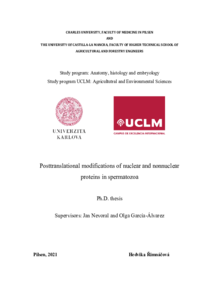Post-Translational Modifications of Nuclear and Non-Nuclear Proteins in Spermatozoa
Post-translační modifikace jaderných a ne-jaderných proteinů ve spermii
dizertační práce (OBHÁJENO)

Zobrazit/
Trvalý odkaz
http://hdl.handle.net/20.500.11956/178201Identifikátory
SIS: 187407
Kolekce
- Kvalifikační práce [357]
Autor
Vedoucí práce
Oponent práce
Krapf, Dario
Álvarez Rodríguez, Manuel
Fakulta / součást
Lékařská fakulta v Plzni
Obor
Anatomie, histologie a embryologie
Katedra / ústav / klinika
Ústav histologie a embryologie
Datum obhajoby
29. 6. 2022
Nakladatel
Univerzita Karlova, Lékařská fakulta v PlzniJazyk
Angličtina
Známka
Prospěl/a
Klíčová slova (česky)
Post-translační modifikace proteinů, histony, (H3K4me2), mužská neplodnost, spermie, (H2S), persulfidaceKlíčová slova (anglicky)
Post-translational modification of proteins, histones, (H3K4me2), male infertility, spermatozoa, (H2S), persulfidationPosttranslační modifikace jaderných a nejaderných proteinů ve spermiích Souhrn Kvůli početí potomka vyhledává pomoc asistovaných reprodukčních technologií (ART) stále více párů. Až za polovinou případů párové neplodnosti, stojí mužská neplodnost, která nezřídka končí diagnózou idiopatická (bez známé příčiny). Hledání nových ukazatelů mužské plodnosti, má proto velký význam pro diagnostiku mužské neplodnisti a případně pro selekci spermiích (ne)vhodných pro použití v ART. Post-translační modifikace (PTM) jaderných a nejaderných proteinů se zdají být vhodnými kandidáty pro takové ukazatele. Na jedné straně jsou PTM jaderných proteinů, protamínů a histonů, které odrážejí zralost chromatinu spermie, jeho připravenost na oplození a také kvalitu budoucího embrya. Na druhé straně jsou PTM nejaderných proteinů, zahrnující cytoplasmatické, cytoskeletární a membránové proteiny, které odrážejí schopnost spermie podstoupit hyperaktivaci, kapacitaci a akrosomální reakci, jinými slovy procesy, které jsou nezbytné pro nalezení a oplození oocytu. V této práci předpokládáme, že PTM jaderných a nejaderných proteinů odrážejí kvalitu spermií, a tak mohou sloužit jako selektivní ukazatele pro využití v ART. Dále předpokládáme, že přidání hydrogen sulfanu (H2S) do in vitro manipulačního média, zlepší motilitu a viabilitu...
Posttranslational modifications of nuclear and nonnuclear proteins in spermatozoa Summary The number of couples who need the help of assisted reproductive technology (ART) has increased over the years. Approximately half of the cases are caused by male infertility, which is often diagnosed as idiopathic infertility. Therefore, the search for male fertility markers will improve male infertility diagnosis, thereby facilitating advanced sperm treatment and selection via ART. Posttranslational modifications (PTMs) of sperm nuclear and nonnuclear proteins are suitable candidates for such markers. The PTMs of protamines and histones reflect sperm chromatin maturity and its readiness for fertilization, and accordingly, they can predict the outcome of ART. However, the PTMs of nonnuclear proteins, including cytoplasmic, cytoskeletal, and membrane proteins, reflect the ability of sperm to undergo hyperactivation, capacitation, or acrosome reactions, which are processes essential for fertilization. We hypothesize that the PTMs of nuclear and nonnuclear proteins can reflect sperm quality and, thus, serve as a valuable marker in ART. Additionally, we suggest that the in vitro addition of hydrogen sulfide into the sperm-manipulating media improves sperm motility and viability via persulfidation. We used Western blot...
